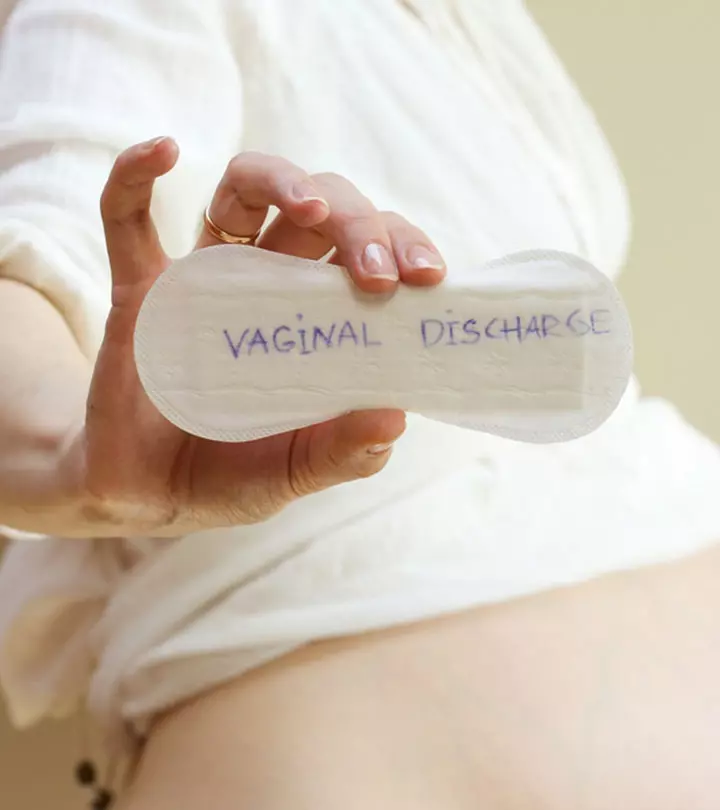
Image: Shutterstock
The amniotic fluid acts as a cushion to the baby in your womb. It also helps in the development of the baby’s lungs, digestive tract, and muscles. Too high or too little fluid volume may sometimes cause complications in pregnancy.

In this MomJunction post, we will help explain the significance of amniotic fluid.
Key Pointers
- Polyhydramnios is a rare condition seen in one out of 100 cases.
- Diabetes, twin-to-twin syndrome, congenital disabilities such as duodenal atresia, and fetal anemia are some causes of polyhydramnios.
- Symptoms include shortness of breath, contractions, stomach discomfort, swelling of the legs or abdominal wall, etc..
- Serious cases of polyhydramnios can increase the risk of premature labor, infections, placental abruptions, and stillbirth.
What Is Polyhydramnios?
Excess build-up of amniotic fluid around the growing baby is termed as polyhydramnios or hydramnios (1). According to the Fetal Medicine Foundation, UK, this condition occurs in one out of 100 cases (2).
Ideally, the doctor checks the amniotic fluid levels through an ultrasound. The normal volume of amniotic fluid should be between 500 and 1000ml. If it goes beyond this, there could be certain problems in the pregnancy.
What Are The Causes Of Polyhydramnios?
In most cases, it is not clear why the amniotic fluid levels increase. However, some possible causes are:
- Diabetes: According to the University of Rochester Medical Center, women who had diabetes before pregnancy or have gestational diabetes (maternal diabetes) could be at risk of hydramnios (1).A mother of one recalls her experience of dealing with diabetes and high amniotic fluid during pregnancy, and the measures she took that helped her. She notes, “I can’t help but ask Robert (the sonographer) a question. I have been leaking fluid every few days since week 24. Was there enough amniotic fluid? A new, long word flies our way – polyhydramnios – like a boomerang, the word wraps around my head and flies back across the room at Robert, who offers up the definition. ‘Actually, your fluid is too high. It’s increased since your last scan… I’m recommending a gestational diabetes test. And we’ll see you for another scan at 34 weeks,’ Robert says. Back in the clinic, Christine (the nurse) confirms my diagnosis of gestational diabetes (i).”

- Twin-to-twin syndrome: In this rare condition, the twins share a placenta. The baby that sends blood to its twin will have less amniotic fluid around, and the baby that receives it will have a high volume of amniotic fluid or polyhydramnios (3).
- Birth defects: Congenital anomalies such as duodenal atresia or conditions relating to the heart or lungs (hydrops fetalis) may also lead to the building up of fluid, causing polyhydramnios (4).
- Others: Some other conditions, such as viral infections, fetal anemia, and kidney or heart problems, can also be responsible for increased amniotic fluid levels in the uterus (5) (4).

- Most commonly, however, there is no cause for higher amniotic fluid, termed, “idiopathic”.
 Point to consider
Point to considerSymptoms Of Polyhydramnios
Excess amniotic fluid can put pressure on the uterus and nearby organs
- Discomfort in the stomach

- Shortness of breath
- Contractions
- Swelling in the abdominal wall and lower extremities
- Change of fetal position
- A uterus enlarged more than normal for that time in pregnancy.
 Things to know
Things to knowPolyhydramnios could be mild, moderate, or severe. Severe polyhydramnios is associated with the following complications (2) (6).
- Too much fluid can expand your uterus and result in preterm labor
- Early rupture of the amniotic sac
- When amniotic fluid leaks, there could be placental abruption (detachment of the placenta from the uterus)
- Umbilical cord prolapse (when the umbilical cord drops into the vagina)
- Heavy bleeding after birth
- Stillbirth
- Fetal macrosomia due to maternal diabetes
- Severe preeclampsia
The condition also increases the risk of cesarean delivery. Therefore, timely diagnosis is necessary to prevent these risks and reduce the chances of maternal and fetal distress.
Diagnosis Of Polyhydramnios

Upon prenatal visit, your doctor would evaluate your symptoms and take a thorough medical history, depending on which they will recommend a fetal ultrasound. If the results hint at excess amniotic fluid, a detailed ultrasound is done (6).
There are two ways to measure the volume of the amniotic fluid.
- The latest method and most accurate is measuring the deepest vertical pocket of amniotic fluid, called the “DVP”. The normal range is greater than 2cm but less than 8cm.
- The second method is AFI or amniotic fluid index, which is the sum of the largest pockets of different parts in the uterus. If this measurement is greater than 25cm, it suggests excess amniotic fluid volume.
How Can Polyhydramnios Be Treated?
Polyhydramnios rarely require any treatment. However, scheduled ultrasounds are done to closely monitor the amniotic fluid index and the baby’s health.
Rarely occurring but in severe cases of polyhydramnios, a few treatments may be recommended to reduce the amniotic fluid level becoming symptomatic with shortness of breath or signs and symptoms of preterm contractions. Treatment options may differ depending on certain factors such as the severity of the condition, its cause, symptoms, and gestational age (8).
- Medications: Based on the cause of excess amniotic fluid in the uterus, doctors prescribe medicine to reduce the fluid. For instance, if hydramnios is due to a fetal condition, then medicine to treat that condition is prescribed. This, in turn, adjusts the fluid level.

- Amnioreduction: In this procedure, the doctor inserts a needle inside the uterus to drain out the excess amniotic fluid. This procedure may cause a little discomfort in the abdomen.
- Delivery: In case of complications that seem risky for the mother’s or baby’s health, early delivery is scheduled. Vaginal delivery may not be the most viable option, and there is an increased chance of cesarean section. According to a meta-analysis by researchers from multiple institutions, pregnancies with polyhydramnios have a 2.31 times higher risk of requiring cesarean delivery than those without it
Besides the treatment, following a few self-care measures can help.
Can Polyhydramnios Cause Birth Defects?
Polyhydramnios or too much amniotic fluid may rarely indicate that there could be a congenital anomaly or a birth defect in the baby, but it does not cause them.
If the doctor finds that there is too much amniotic fluid, an ultrasound or other tests could be done to analyze the risks. The treatment options are recommended based on the results.
Is Polyhydramnios Dangerous For The Baby?
A severe case of polyhydramnios could increase the risks of preterm labor, placental abruption, infections, and stillbirth. However, proper diagnosis and treatments in time can help in cutting down these risks.
Frequently Asked Questions
1. Can too much amniotic fluid harm the baby?
In most cases, having too much amniotic fluid around your fetus will not affect your pregnancy. However, you will have a healthy baby without significant risks with extra medical check-ups (9).
2. How can I reduce my amniotic fluid naturally during pregnancy?
There are no natural ways to reduce excessive amniotic fluid (polyhydramnios) during your pregnancy other than clinical management. However, in mild cases of polyhydramnios, no intervention might be needed, while in moderate cases, bed rest can be helpful (10).
3. Does high amniotic fluid mean a big baby?
High amniotic fluid levels, when accompanied by gestational diabetes, may be associated with fetal macrosomia (a large baby) (8). In these cases, the fetus may grow too large for a vaginal delivery (11). However, it’s important to note that high amniotic fluid levels alone do not always indicate a big baby, and other factors can also contribute to the baby’s size.
4. Can drinking too much water affect amniotic fluid?
Maternal hydration may influence the formation of amniotic fluid (12). However, excessive intake of fluids alone is unlikely to cause polyhydramnios. Polyhydramnios is typically related to underlying medical conditions or fetal abnormalities.
5. How common is too much amniotic fluid?
Polyhydramnios occurs in approximately 1-2% of pregnancies (13). Its severity may vary from person to person depending on individual health and underlying conditions.
6. Can polyhydramnios cause autism?
As per a study, polyhydramnios may influence the severity of autistic symptoms, specifically the stereotypical behaviors and social-communication problems (14). Autism spectrum disorder (ASD) is a complex condition with multifactorial causes, and further research is needed to fully understand the relationship between polyhydramnios and autism.
7. What can be done to prevent high amniotic fluid levels during pregnancy?
Prevention of polyhydramnios may not be possible since it is often associated with underlying medical conditions (11). However, maintaining good prenatal care and managing existing medical conditions may help reduce the risk.
High amniotic fluid, also known as polyhydramnios, is a pregnancy issue discovered during routine prenatal checks with ultrasound. While the majority of cases of polyhydramnios are idiopathic, additional factors such as diabetes in the pregnant mother or birth abnormalities could be to blame. Stomach pain, abdominal contractions and swelling, dyspnea, and other symptoms may occur. However, since polyhydramnios is a rare illness, there is no reason to get alarmed. Even if your doctor detects or diagnoses you with the illness, getting treatment and care as soon as possible can help reduce the dangers.
Infographic: Symptoms Of Excess Amniotic Fluid In Pregnant Women
As polyhydramnios can have adverse effects on both the mother and the baby, it is crucial to be aware of the signs and symptoms of this condition. Early detection and prompt medical attention can minimize any potential risks. Scroll through the infographic below to learn some warning signs of polyhydramnios in expectant mothers.
Some thing wrong with infographic shortcode. please verify shortcode syntaxIllustration: Causes Of High Amniotic Fluid (Polyhydramnios) In Pregnancy
_in_pregnancy_illustration.jpg.webp)
Image: Dall·E/MomJunction Design Team
Polyhydramnios, is a condition where there is too much amniotic fluid during pregnancy. This video gives valuable insights into its causes, signs, diagnosis, and treatment.
Personal Experience: Source
MomJunction articles include first-hand experiences to provide you with better insights through real-life narratives. Here are the sources of personal accounts referenced in this article.
i. Thirty-two weeks pregnant: a diagnosis;https://mum100.wordpress.com/2017/06/25/thirty-two-weeks-pregnant-a-diagnosis/
References:
1. Hydramnios; University of Rochester Medical Center
2. Polyhydramnios; The Fetal Medicine Foundation
3. Twin-to-twin transfusion syndrome; C. S. Mott Children’s Hospital Michigan Medicine
4. Polyhydramnios treatment at Midwest Fetal Care Center; Children’s Minnesota
5. Polyhydramnios; Darthmouth-Hitchcock
6. Polyhydramnios; Hartford HealthCare Medical Group
7. Polyhydramnios; Spectrum Health The Medical Group
8. A. Hamza, D. Herr, E. F. Solomayer, and G. Meyberg-Solomayer; Polyhydramnios: Causes, Diagnosis and Therapy; Geburtshilfe und Fraueneilkunde (2013)
9. Polyhydramnios (too much amniotic fluid); NHS
10. Polyhydramnios: High Amniotic Fluid During Pregnancy; American Pregnancy Association
11. Polyhydramnios; Cleveland Clinic
12. How much water should I drink during pregnancy?; The American College of Obstetricians and Gynecologists
13. Daniel S. Hwang and Heba Mahdy;Polyhydramnios; NIH
14. Yi-Ling Chien et al.Prenatal and perinatal risk factors and the clinical implications on autism spectrum disorder; (2019)
Community Experiences
Join the conversation and become a part of our nurturing community! Share your stories, experiences, and insights to connect with fellow parents.
Read full bio of Dr. Christian Pope
Read full bio of Rebecca Malachi
Read full bio of Dr. Ritika Shah
Read full bio of Reshmi Das
















